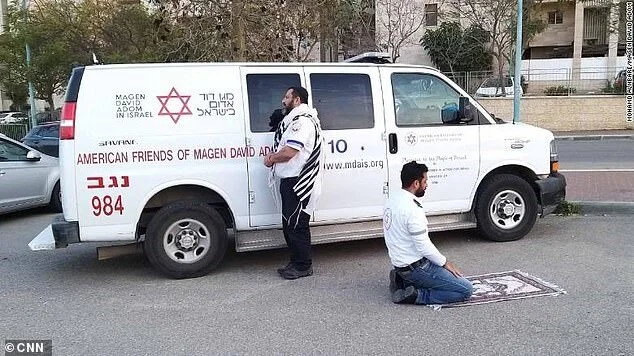A Jewish paramedic faces Jerusalem, his prayer shawl hanging off his shoulders while a Muslim paramedic kneels facing Mecca, his prayer rug unfurled before him.
While in my over three quarters of a century on this planet I have never experienced anything like the events taking place world-wide with Covid-19, there are aspects of it, from my long view over many years, that I can see repeating themselves. Take for instance, the debate over calling this disease the “Chinese” virus which has caused people to yell and/or attack people on the street who look Asian.
I have always had an interest in the Second World War. While I was only an infant during the course of that conflict, I think my interest evolved because my father was shot down while flying a B-29 bomber over China. I felt a compulsion to learn about the war’s history as it was also a record of a parent I had neither met nor known.
Because of this interest, I would listen with attention to my mother’s tales about events after the bombing of Pearl Harbor in 1941. She was attending the University of California at Berkeley, and would tell two stories from that time that I always remembered. The first was the fact that many Americans of Chinese descent wore signs around their necks declaring themselves Chinese so their Asian faces would not be mistaken for Japanese by a frightened population. She also, in something I always admired, organized her whole sorority to go to a neighborhood corner store owned by a Japanese-American citizen to buy up as much as they could of his merchandize. She wanted him to have some money in his pocket as he and his family were taken to the desert detention camps where they remained for the duration of the war. In this instance, once again, fear of the unknown causing us as a nation to do something to some of its citizens that was indefensible.
The next instance was from my own personal experience. My step-father worked for the United States Information Agency and was assigned to one of their libraries and information centers in Hiroshima, Japan in 1956. As we left home, the United States was facing one of its earliest onslaughts of a disease which was named by Americans the Asian flu. We arrived in Japan and I promptly fell very ill with flu-like symptoms. We were staying with another American family stationed there and our hosts, alarmed as I got worse, had a Japanese doctor come to the house to check me out. I was prodded and poked and then this Asian man announced to his American audience that I had a very bad case of …….. the Occidental Flu.
The truth is that disease knows no national boundaries, no defining race, no form of government, no gender. It is a thoughtless, mindless entity that strikes out indiscriminately wherever it finds a home. We, as its universal potential victims, need to use our intelligence, courage, and kindness to fight this epidemic rather than fight among ourselves. Perhaps the picture which accompanies this blog, that has gone viral, expresses the best hope for mankind.

